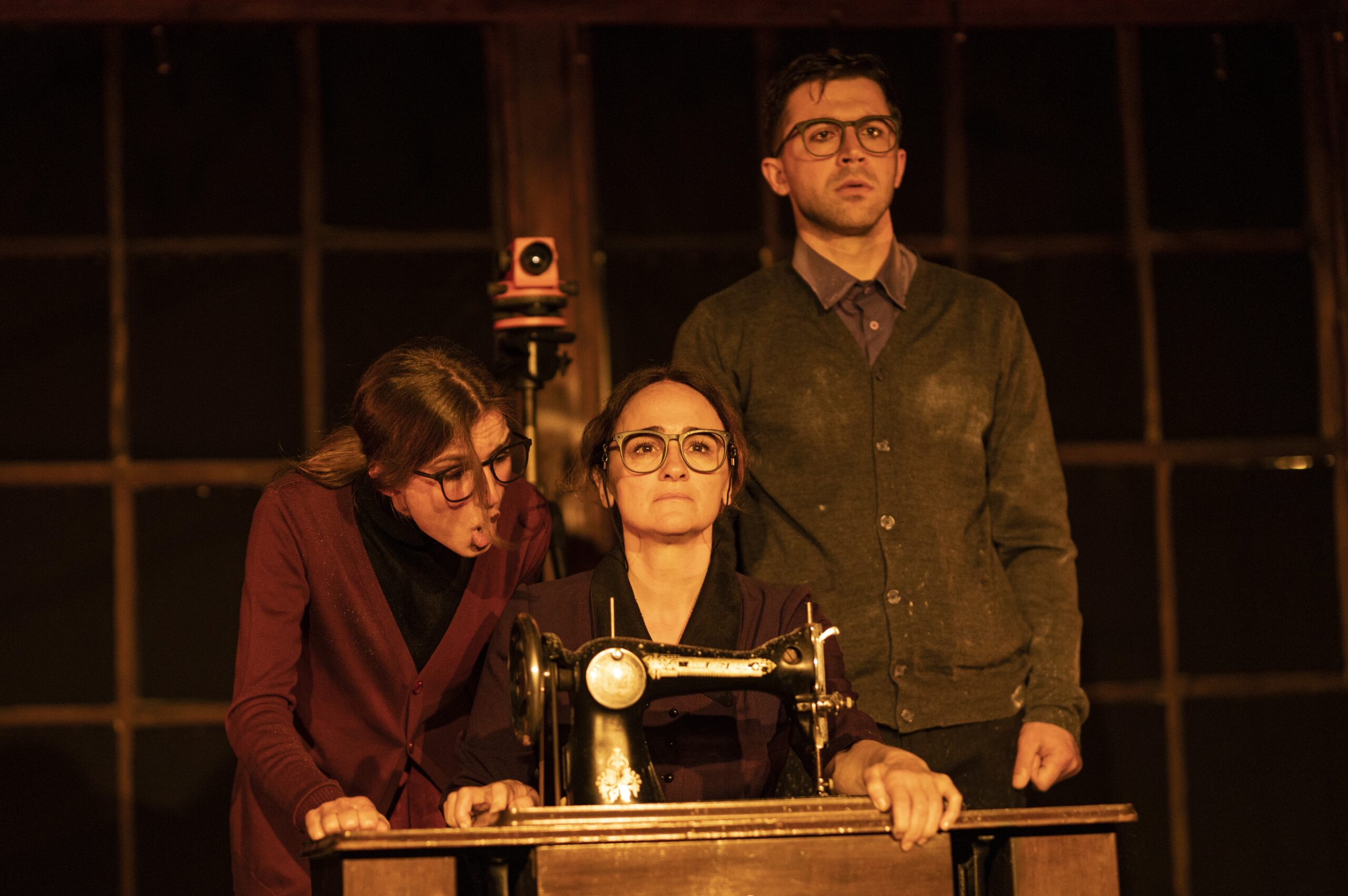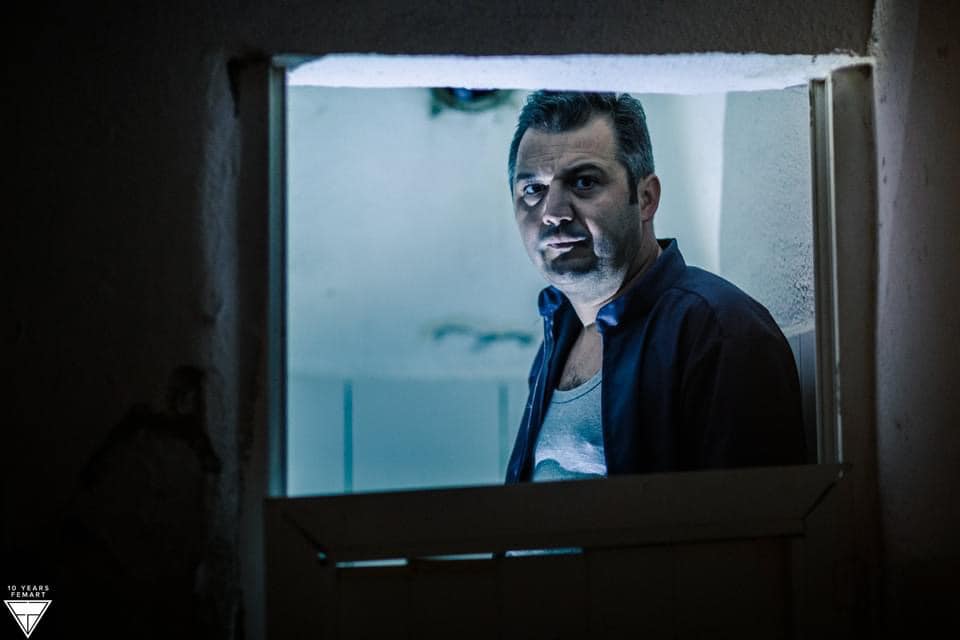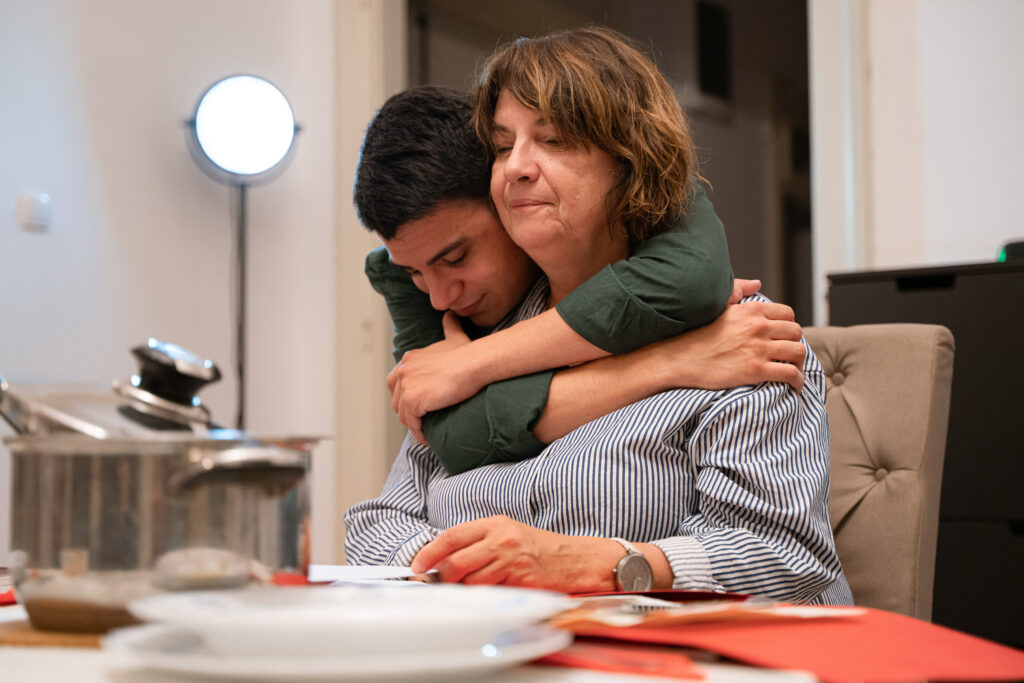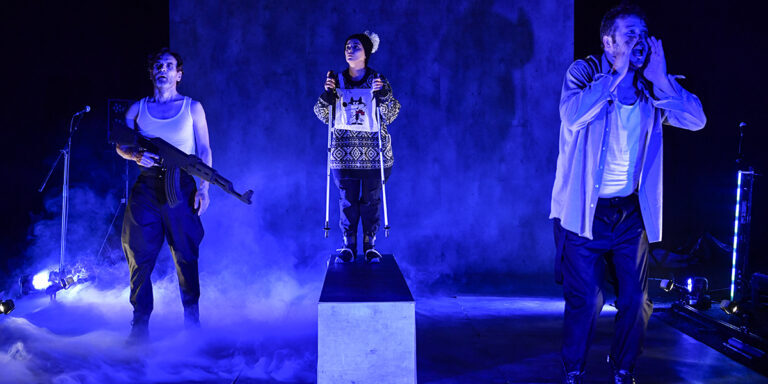The fifth edition of the Kosovo Theatre Showcase took place between 25th-29th October. Berat Bajrami reflects on the festival as a space for social critique and international collaboration.
The noise emanating from the Oda Theatre became even more resounding as I walked down the stairs to the foyer. An international audience was in attendance to watch performances from the Kosovo Theatre Showcase and the energy and enthusiasm of the people, talking in English, Albanian Italian, Turkish, German and other languages, was palpable.
The fifth edition of the Kosovo Theatre Showcase took place over five days between 25th – 29th October 2022. It both expanded my horizons and opened a door between Kosovo Theatre and the world. It became a space in which theatre can breathes freely and courageously address taboo topics, while strengthening and expanding connections between the regional theatre scene and the rest of the world.
The showcase opened with Father and Father, written by Jeton Neziraj, an intimate performance in which the audience becomes part of a family trauma from 23 years ago. The call for justice for the more than 1,600 missing persons in Kosovo resounded strongly through the play, which was directed by Kushtrim Koliqi. The staging, at Prishtina’s Ethnographic Museum, was simple with very few props except for a sewing machine. There were just three characters, a mother (Ilire Vinca) and a daughter (Kosovare Krasniqi), and a father (Bujar Ahmeti), though it gradually becomes apparent he is a ghost. The performance took us on an emotional journey from denial to longing, pain to hope. The play was a call for social reflection and a potent reminder of the results of the war, which is ‘still knocking on our doors’.

Father and Father – Integra
One of the most significant performances of this edition was The Handke Project, again written by Jeton Neziraj and directed by Blerta Neziraj, a partnership that led the Kosovo Theatre Showcase. An essential political statement, The Handke Project contained a triple critique; it is the voice of the victims of Slobodan Milošević, an analysis of the propaganda of the author Peter Handke, and of the ‘civilized Europe’ that does not speak up for small countries and which tries to cover up scandal with a bigger scandal – by giving Handke the Nobel Prize for Literature.
An international co-production, The Handke Project explores the type of European mentality that tends to reduce and dismiss the pains and tragedies of smaller countries, especially those of the Balkans. Neziraj pokes fun at Handke’s stylistic manner, especially the question mark he constantly deploys. Handke’s question mark is not that of a curious writer, in search of the truth, but in search of a deviation of the truth. He uses it to create confusion, by denying Serbia’s crimes against the population in Bosnia and Herzegovina and Kosovo.
Other taboo themes were explored in Our Son, a production by Heartefact about sexual identity and societal acceptance, and Doruntina Basha’s Stiffler, a powerful piece about sex workers and the patriarchy. Both performances evoked serious debates and audience applause.
The showcase also included Husino’s Miner – My Past is Your Future, a piece which looked at post-socialist transition through the worker’s rebellion of 1920. I learned more from Kosovo for Dummies, Jeton Neziraj’s play about the discrimination against immigrants and the recognition of human rights in Europe. The Afterloss, explored the human experience and emotional journey of losing a loved one, while Death Hour depicted the experience of political prisoners in Kosovo and Albania, portraying the destiny of one nation in two states. This play performed in Prishtina’s Prison Museum was a new experience for me and a great introduction to an unknown history, that happened not too long ago.
The showcase also included panel discussions, conversations about performances, and networking events. Engaging conversations between theatre critics, journalists, directors, playwrights, and organizers took place in the corridors, on the squares and on the buses to Gjilan and Ferizaj. These conversations revealed to me the cultural power of theatre. After each performance, or panel discussion, my conviction that theatre has the power to transform society was strengthened. This is not done with one or two, or even ten artworks, it is a process of continuous transformation over the years. All the activities during the showcase made me reflect on the role of art, and of the artist in society, and vice versa.
According to the playwright Jeton Neziraj, who is also the director of Qendra Multimedia, the impact of the Kosovo Theatre Showcase, which he founded five years ago, has started to become visible now. The purpose of the showcase is that Kosovo theatre continues to grow and develop throughout the region and becomes accessible to all who are interested to become part of it. It is a platform for networking and collaboration.
“Gjilan Theatre participated in two important festivals in Poland and received the main award in the Polish Festival,” Neziraj tells me. “This may seem a small step, but it is a very important one for a theatre that attended a [festival] outside of the region for the first time. Therefore, these are benefits that are sometimes direct, sometimes long-term. The public also benefits. Besides seeing Kosovar plays, they also connect with each other. The showcase has started to become a reference point for the theatre in the region. During these days we noticed that many people became friends, and initiated different projects, and collaborations,” said Neziraj.
Steven Leigh Morris, a playwright and a journalist from Los Angeles, had a positive opinion on Kosovo theatre plays. Visiting for the second time, he tells me that, in his opinion, the actors were very strong; the vision of the plays was powerfully presented and the tone of the showcase extremely serious. ‘I think it’s a theatre that’s not interested in diversions and it’s not frivolous. It’s taking the cultural issues, the political issues and the history and just plunging into all of that without any fear and very intensely that’s the impression I’ve taken, and I respect that,’ said Morris.

Death Hour – Prishtina Prison Museum
Rebuilding the regional theatre scene
This year, the National Theatre of Kosovo closed its doors to undergo a renovation that was long needed. The interior and the exterior needed a major repair after five decades of being open to the public. The National Theatre presented hundreds of plays throughout the years and also kept up cultural education and advancement. The closing of the National Theatre’s doors this year had a great impact on this edition of the Kosovo Theatre Showcase, which had to use three non-theatrical spaces for the presentation of performances instead, including the Prison Museum, the Ethnological Museum, and the Lapidarium of the National Museum of Kosovo, in which Our Son was presented.
Since it was founded, the Kosovo Theatre Showcase has created a new dynamic in the Kosovar theatre scene. According to Neziraj, the showcase has encouraged the increase of the quality of the productions within institutions and within theatre companies.
‘Theatres know that if a show is in the showcase someone from the abroad has come and seen it. This has given rise to the need to bring a new aesthetic to the scene that is no longer limited to a local audience, but also to an international audience. This has increased the expectations and has set new cultural standards on the theatre scene in motion, which was otherwise extremely poor’, said Neziraj. ‘This concept serves as a platform where we connect with each other, organize together, exchange information, techniques, and a necessary synergy is created for a theatre scene which used to be extremely poor and isolated’. The Kosovo Theatre Showcase has built a cooperative bridge between the region and the world, in this way increasing the social impact and the presence of theatre in the artistic and cultural scene in Kosovo.
For Borisav Matić, a young critic and dramaturg from Serbia, regional collaboration is the only way for theatre to function and grow and expand. “Our national theatre scenes are so small and if we don’t reach out to our neighbouring countries and neighbouring scenes, I think it will be hermetic, and isolated. When you look at all these performances that have artistic or social impact; they go beyond national boundaries and examine the topics that are important to all of us here,” said Matić.
The Balkans have experienced so much pain, as a result of wars and inter-ethnic conflicts, but art is a space that unites people and builds bridges of cooperation.

Our Son – Heartefact
What does the future look like?
Despite difficulties with spaces and finances, the theatre scene has proven the will and courage to play its role in the positive transformation of society. Since the end of the war, 22 years ago, theatre has become a platform of healing, forgiveness, trust, and friendship. It helps to deal with the loss of the past. In addition to offering a new perspective, theatre is also a space for entertainment, bringing people together and creating a warm and friendly atmosphere. This international showcase did this – bringing together many artists and co-productions, from Serbia, Bosnia and Herzegovina, Germany, and Israel presenting plays often by independent groups, companies, foundations and cultural organizations. It brought a sense of excitement through different languages and artists from different cultural backgrounds in the Balkans using theatre to build peace through sharing their talents and stories.
The experience gave me an opportunity to recognize what an impact the theatre showcase had on me. Not only did I immerse myself in a variety of stories, but I felt as a part of a creative force that pulled me into different dimension, different realities. I experienced a range of emotions from sadness to joy, from confusion and anger. I met extraordinary people and spent a great deal of time trying to discuss my impressions with them. I have become richer and more experienced in understanding life with new friends that I look forward seeing next year. As one journalist said to me – theatre makes our world larger, and it brings us closer together.
Further reading: Kosovo Theatre Showcase 2021: power play, puppetry and cultural mash-ups
Further reading: The Handke Project: “Peter Handke is a project of the times in which we live”
Further reading: review of Our Son
Further reading: review of Father and Father
Berat Bajrami is a young artist, activist and journalist from Kosovo. He studied Fine Arts in the Printmaking Department at the University of Prishtina. For more than five years he has worked as a journalist in the KOHA Group. He collaborated with Dr Ellen Frank during the Cities of Peace projects in Prishtina and received the status of “Artist Peace Builder”. From 2021 he has worked at Artpolis as project coordinator.








